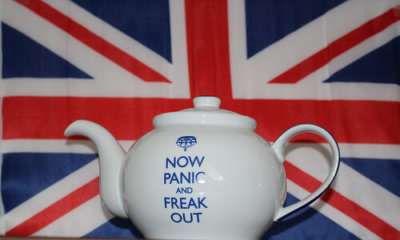How to Handle Anxiety From National Events

By: frankieleon
When bad news hits a nation anxiety levels raise and many of us end up in a state of emotional shock it can feel hard to shake. So what to do?
1. Go for shades of grey.
With your thoughts, that is. Dramatic, black and white thinking is the brain’s survival response to stress, but leads right to anxiety and depression.
Look out for thoughts that begin with, “everything will/nothing will” and sentences that have the words “never/ever” or contain suggestions of doom.
Life is rarely composed of absolutes. Ask yourself what the ‘grey’ thought is. Instead of ‘we are all doomed’ is it possible that ‘this is a difficult time for many but eventually some kind of balance will be found again’?’
2. Feel it out.
Trying to act calm in the face of national upset can seem a good tactic, but repressing emotions only leads to a build up of anxiety.
We might think we are processing our emotions when we turn to endless talk, analysis, and media bingeing, but really, all we are doing is thinking. And thinking can be the best smokescreen to feeling there is.
Take time alone to recognise how you, personally, are feeling. A moment of sheer rage, or a good cry can be a step out of shock and towards clear thinking.
2. Step away from the circus.
Modern media is designed to be addictive. It can be a wise idea to time your internet or TV usage.
If you are finding yourself truly anxious each time you read the news, consider asking a friend who feels less affected to get in touch when there are actual updates to be had.
4. Try some perspective hopping.
Stress causes us to only focus on what is right in front of us. The outcome can be a very limited perspective.
What would someone in a war-torn environment or impoverished nation think of the situation that is causing you stress? Or a person 5 years in the future? Is it possible, despite the atrocity you are worried about, that this might be long sorted by then?
5. Show self-compassion.
When stressful national events hit our mind can have a field day going into protective ‘us against them’ mode, and we find ourselves having thoughts that go against the values we thought we had, which can lead guilt, shame, and low moods.
Thoughts are just thoughts, not actions, and you are more than just your thoughts. So show yourself some self-compassion over it, as the more compassionate we can be with ourselves, the more we can actually then generate for others.
6. Connect at all costs.

By: Dee’lite
There is nothing like difficult national or global events to trigger deep loneliness for those without a partner or family nearby.
If family are not checking in on you, understand that if they are far from the events they simply might not have a full understanding. Online therapy or call them first.
As for friends who are suddenly be too busy with their own families to give us the support we expected, why not reach out to acquaintances? National trauma can be a time we connect over shared values and you might end up with new friends.
7. Focus on what CAN be done.
Even a small action can alleviate the anxiety feeling useless can bring. Is there a petition to sign, a charity you trust that you can donate to? Or, can you help others who are also finding managing the fallout of the event stressful? Volunteering has been proven to alleviate low moods.
8. Breathe better.
It might sound annoyingly simple and patronising, but it’s science. Belly breathing, into your diaphragm, can counter the affect the fight or flight response has on your nerve symptoms. And when we are stressed, we tend to breathe in a much more shallow way, so we really do need the reminder.
9. Make it mindful.
And while you are doing some focussed breathing, why not take it one step further and try some mindfulness? Even a two minute mindfulness break is better than nothing, but twenty minutes or more a day can see you catching your anxious thoughts more often and recognising what is going well right here and now.
10. Seek serious support.
If your anxiety seems overwhelming, or you recognise that it is bigger than just the situation at hand, it could be that national upset has triggered old worries and fears for you and is having a ‘snowball’ affect on your moods.
Do consider anxiety counselling. Anxiety left to go on to long can roll right into depression or anxiety disorders which can be harder to treat.
Do you have a tip for handling anxiety from national events? Share with our readers below.






This is one of those “wish I had said that articles.” When I was a college sophomore (many moons ago) I was taking a course in Argumentation and Persuasion and we talked about all or none thinking…which can also be called black and white thinking. Understanding the problems with this mindset has been so helpful to me all these decades now. Thanks for your good work!
Thank you so much we really appreciate hearing this… great to know our work resonates! Yes, all or nothing thinking is the same. You might find our piece on cognitive distortions a good read…https://www.harleytherapy.co.uk/counselling/cognitive-distortions.htm. It’s interesting to realise the tricks the mind gets up to and to realise that we are much more than just our thoughts!